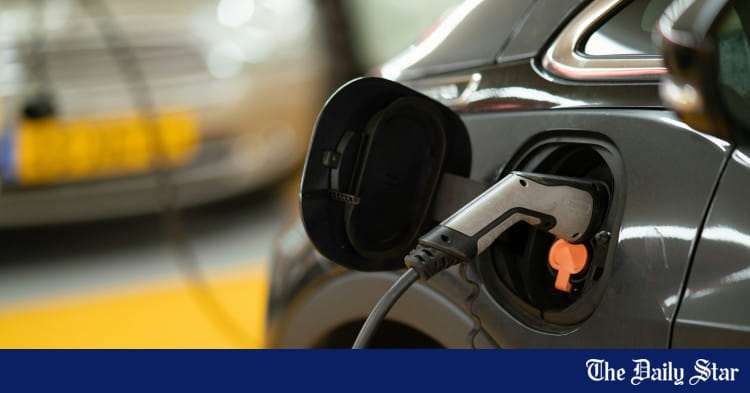Saif
Senior Member
- Joined
- Jan 24, 2024
- Messages
- 15,397
- Reaction score
- 7,874
- Nation

- Residence

- Axis Group


BYD launches Bangladesh’s first plug-in hybrid EV with exclusive customer delivery ceremony
CG Runner BD Limited, the official distributor of BYD vehicles in Bangladesh, hosted a landmark customer delivery ceremony on Friday to unveil the BYD Sealion 6 — the country’s first DM-i Super Plug-in Hybrid Electric Vehicle (PHEV). The exclusive event took place at the BYD Flagship Sh
BYD launches Bangladesh’s first plug-in hybrid EV with exclusive customer delivery ceremony
FE ONLINE DESK
Published :
May 30, 2025 19:07
Updated :
May 30, 2025 19:07

CG Runner BD Limited, the official distributor of BYD vehicles in Bangladesh, hosted a landmark customer delivery ceremony on Friday to unveil the BYD Sealion 6 — the country’s first DM-i Super Plug-in Hybrid Electric Vehicle (PHEV). The exclusive event took place at the BYD Flagship Showroom on Shaheed Tajuddin Ahmed Avenue in Tejgaon, Dhaka.
The ceremony marks a major milestone in Bangladesh’s transition towards smarter, more sustainable mobility solutions. As part of its broader mission to promote environmentally responsible transportation, BYD Bangladesh continues to pave the way for greener alternatives in the automotive sector.
The BYD Sealion 6 represents a new era of hybrid technology, combining the convenience of electric driving with the extended range of a traditional fuel engine. Noted for its impressive fuel efficiency and cutting-edge features, the model is poised to set new standards in the country’s hybrid vehicle market.
Speaking at the event, Mr Fahmid Ferdous, Head of Sales at CG Runner BD Ltd, said, “The BYD Sealion 6 brings together efficiency, cutting-edge technology, and bold design — making it an ideal choice for drivers ready to embrace smarter, future-ready mobility. This successful delivery milestone highlights our dedication to bringing world-class automotive innovation to the Bangladeshi market in a way that’s both practical and aspirational.”
The event was attended by customers, media representatives, industry stakeholders, and automotive enthusiasts, all gathered to witness the introduction of this innovative new vehicle to Bangladesh’s evolving car market.
The delivery ceremony not only celebrated the launch of a new vehicle but also reinforced BYD Bangladesh’s commitment to shaping a cleaner, smarter future through technological advancement and sustainable transportation.
FE ONLINE DESK
Published :
May 30, 2025 19:07
Updated :
May 30, 2025 19:07
CG Runner BD Limited, the official distributor of BYD vehicles in Bangladesh, hosted a landmark customer delivery ceremony on Friday to unveil the BYD Sealion 6 — the country’s first DM-i Super Plug-in Hybrid Electric Vehicle (PHEV). The exclusive event took place at the BYD Flagship Showroom on Shaheed Tajuddin Ahmed Avenue in Tejgaon, Dhaka.
The ceremony marks a major milestone in Bangladesh’s transition towards smarter, more sustainable mobility solutions. As part of its broader mission to promote environmentally responsible transportation, BYD Bangladesh continues to pave the way for greener alternatives in the automotive sector.
The BYD Sealion 6 represents a new era of hybrid technology, combining the convenience of electric driving with the extended range of a traditional fuel engine. Noted for its impressive fuel efficiency and cutting-edge features, the model is poised to set new standards in the country’s hybrid vehicle market.
Speaking at the event, Mr Fahmid Ferdous, Head of Sales at CG Runner BD Ltd, said, “The BYD Sealion 6 brings together efficiency, cutting-edge technology, and bold design — making it an ideal choice for drivers ready to embrace smarter, future-ready mobility. This successful delivery milestone highlights our dedication to bringing world-class automotive innovation to the Bangladeshi market in a way that’s both practical and aspirational.”
The event was attended by customers, media representatives, industry stakeholders, and automotive enthusiasts, all gathered to witness the introduction of this innovative new vehicle to Bangladesh’s evolving car market.
The delivery ceremony not only celebrated the launch of a new vehicle but also reinforced BYD Bangladesh’s commitment to shaping a cleaner, smarter future through technological advancement and sustainable transportation.



